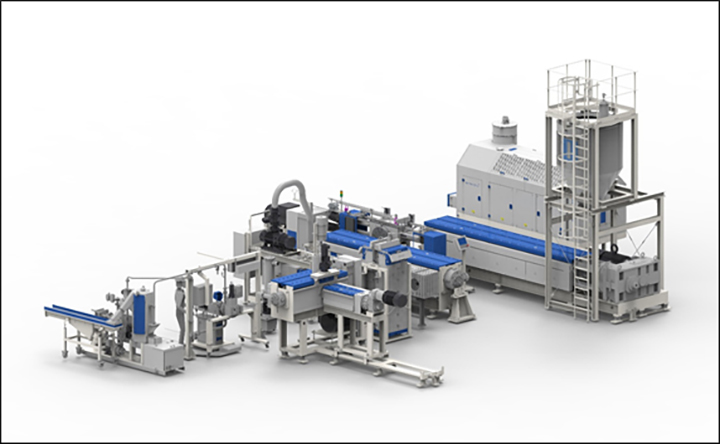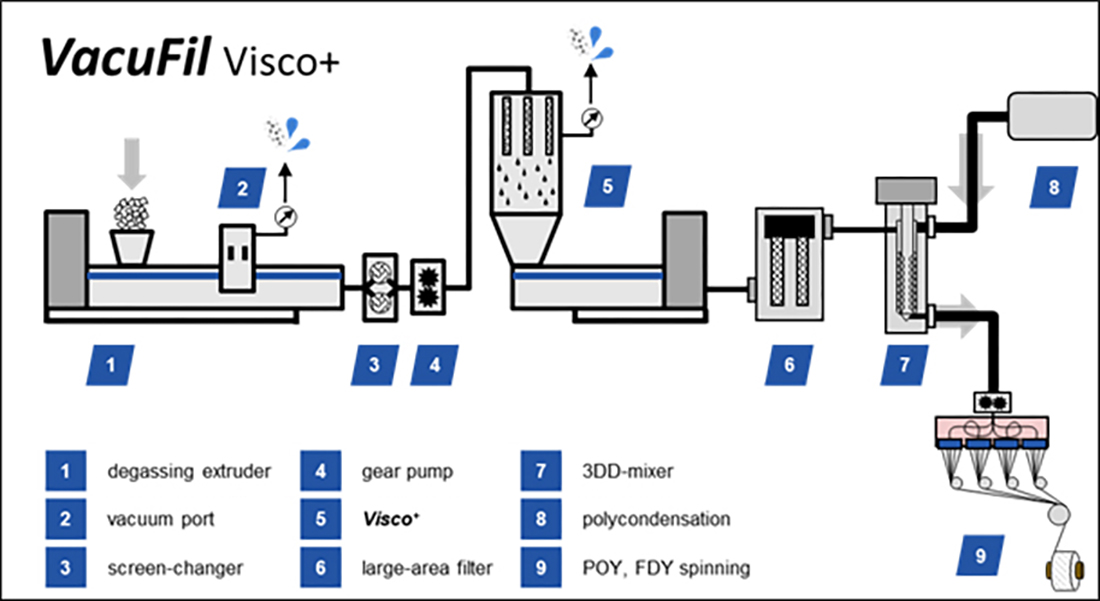Across the globe, consumers are demanding sustainable products and the careful utilization of resources – increasingly so in the textile sector. As a result, textile producers are switching from exclusively virgin polyester to recycled polyester, mostly made of bottle waste.
So far, post-production fiber waste itself has not been recycled into new high-class fibers, but only reused to manufacture sub-premium goods, such as insulating materials. However, upcycling fiber waste into new high-end products within the polyester filaments, fibers and nonwovens markets is now possible.
BB Engineering’s VacuFil recycling process enables the manufacture of extremely homogeneous, viscosity-stable rPET melt, providing a precisely definable and reproducible raw material for downstream processes (e.g., spinning).
There are many cases in which the material quality and/or property achieved from bottle waste does not comply with textile application requirements. For numerous textile applications, parameters such as viscosity and homogeneity are crucial and must be subject to virtually no fluctuations. In other words, to enable recycled polyester to be used for more sophisticated textile applications, it requires pretreatment. VacuFil succeeds, depending on the intended end application, in aligning the melt with the process in a targeted manner.

VacuFil unites gentle large-scale filtration and controlled intrinsic-viscosity build-up for consistently high melt quality. Various target viscosities and starting materials are not a problem for VacuFil thanks to the innovative key component, the viscosity boosting Visco+ vacuum filter. A reactor is not required. The attached vacuum unit, which is automatically regulated, removes volatile contamination, ensures a controlled IV-increase and additionally achieves an ideal melt homogeneity, which is vital for the downstream spinning performance. Comprising an inline viscosity measuring unit connected to the vacuum system, the viscosity can be continuously and reliably adjusted. Hence, producers can generate the specific kind of recycled polyester they require for their application.
Figure 1 shows the typical VacuFil process including viscosity boost by Visco+ to upcycle production waste and feed it back into the PET main melt stream, coming from the continuous polycondensation. The PET waste is plasticized by a robust single screw degassing extruder. The upcycling is done by multiple degassing and filtration steps, cleverly combined in and around the vacuum filter unit Visco+. Besides commonly used screen changers for rough particles, large-area candle type filters for fine filtration come into action.
With their modular structure and a performance spectrum of between 300 kg/h and maximum 3,000 kg/h, VacuFil systems open various possibilities for processing polyester waste. Different kinds of input material can be processed into high-quality PET granulate or fed directly into downstream processes, such as the spinning plant. The polyester recycled using VacuFil has already been successfully spun into POY and FDY with virgin like yarn-properties.
The advantage for fiber producers with VacuFil is, that they can take a step further to a zero-waste production and ensure rPET quality. They can produce their own high-class rPET and do not need to take care of the fiber waste disposal. The alternative would be buying rPET material, which may not meet their exact requirements.
Key features & benefits of VacuFil
-
- Visco+ vacuum filter unit
• Rapid IV increase and homogenization - IV-measuring unit
• Enables IV active control - 3DD-mixer
• Easily achieve rPET ratios in main melt stream
• Add additives
- Visco+ vacuum filter unit
Max. throughputs |
|
| VacuFil (flakes to chips) | 300 / 500 / 1000 / 2000 / 3000 kg/h |
| VacuFil Visco+ (IV increase) | 300 / 500 / 1000 kg/h * |
| *IV increase reduces throughput | |
Specific energy consumption including drying |
|
| example VacuFil 1000 | 350 W/kg |
| example VacuFil Visco+ 1000 | 440 W/kg |
| Footprint | 11.5 x 15 m |


